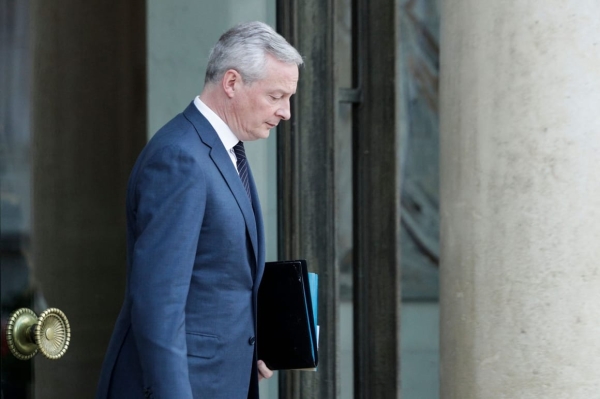EU gives France an ‘F’ grade on spending plans
High deficit puts Paris in breach of EU’s budget rules. Belgium, Finland and Croatia also singled out.
BRUSSELS / PARIS ― The French government has been told by the European Commission it urgently needs to adjust next year’s spending plans to fall into line with the EU’s debt and deficit rules when they return after a four-year suspension.
Paris is among four governments handed warnings over their budget plans by the bloc’s executive in its role policing member countries’ public expenditure. The rules, aimed at preventing instability in financial markets and the build-up of public debt, will retake effect on January 1 after they were shelved to allow greater investment during and after the COVID pandemic.
“France’s draft budgetary plan risks not being in line" with the bloc’s rules, Commission Vice President Valdis Dombrovskis told reporters in Strasbourg, pointing to rising public expenditure and insufficient cuts to energy support.
Belgium, Finland, and Croatia fall into the same category, the Commission said in its statement on Wednesday. Ignoring warnings could trigger a so-called Excess Deficit Procedure, a lengthy process that includes specific demands to rein in spending and potentially concludes with financial sanctions.
These reports cards, and the resumption of the Stability and Growth Pact rules in general, come at a critical time with Europe’s economic growth remaining feeble and high interest rates making borrowing more expensive. Russia’s war in Ukraine and growing tensions in the Middle East add to uncertainty for governments and central banks in Europe and beyond.
’Whatever it takes’
Pressure on France shifts the focus from Italy, which has long been considered the bad boy of Europe when it comes to public spending. Rome isn’t fully out of the woods: its budget is “not fully in line” with the rules, the Commission said. The same goes for Austria, Germany, Luxembourg, Latvia, Malta, Netherlands, Portugal and Slovakia.
French Finance Minister Bruno Le Maire has repeatedly stressed that France’s 2024 budget would mark the end of the era of "whatever it takes" in economic spending, pledging to phase out emergency measures linked to the pandemic and the energy crisis.
As the Commission announced its assessments, a French economy ministry official was quick to stress Paris was unlikely to be punished with an Excessive Deficit Procedure and that it would not need to modify its budget law.
"We won’t have to take any adjustment measure on this evolution of primary net spending," the official said, on condition of anonymity, noting that the gap between France’s spending and Brussels’ recommendation was "very small."
The official insisted that, contrary to other EU countries, France did not receive a written request from Brussels.
Paris sees a deficit next year of 4.4 percent of GDP — exceeding the EU’s 3 percent threshold — and spending cuts of €5 billion. The French budget is still being discussed in the country’s parliament and is set to be approved by Christmas.

The Commission also raised concerns France’s debt-to-GDP ratio will rise to 110 percent of GDP next year. The EU’s limit is 60 percent.
’Because it’s France’
Brussels is under some pressure to show it is serious about enforcing the EU’s deficit and debt rules, regardless of whether governments can agree on their overhaul by the end of the year — a deal that France is trying to broker. The EU wants to make them more flexible and better tailored to individual countries’ circumstances but Germany is leading a group of governments demanding that some strict targets over debt and deficit reduction remain.
France’s violation of the deficit criteria means the Commission could theoretically launch an “excessive deficit procedure” (EDP) from next spring — a red-flag label that means offending countries must adjust their spending.
The French case is particularly sensitive because Paris has received special treatment before. In 2016, the Commission’s last president, Jean-Claude Juncker, justified his decision to give Paris leeway on its budget wrongdoing merely “because it is France."
This article has been updated with quotes from Strasbourg and Paris.




